The Democratic Republic of the Congo (DRC) today reported two new Ebola cases as Uganda announced plans to vaccinate health workers. In another development, two global health experts said urgent high-level support is needed to update the outbreak battle plan and quick action is needed to shore up US leadership.
Pair of new cases in Beni
The latest cases are both from Beni, the outbreak's main hot spot, the health ministry said in its update today. The new illnesses raise the outbreak total to 287 cases, including 252 confirmed and 35 probable infections.
Also, another person died from Ebola—a patient from Butembo—raising the fatality count to 181.
Health officials are still investigating 39 suspected Ebola cases.
Meanwhile, the number of vaccinated people has reached 25,600, roughly half of them from Beni. Today's outbreak said 130 of them are from Vuhovi, a newly affected health zone.
Health workers to be vaccinated in Uganda
In neighboring Uganda, a vaccination campaign will begin on Nov 5 to vaccinate frontline health workers, health officials announced today.
Ainebyoona Emmanuel, public relations officer with Uganda's health ministry, said on Twitter today that the vaccine campaign will focus on high-risk districts and that the country has 2,100 doses on hand to vaccinate health workers.
Reassessing the response
Two global health experts from the Center for Strategic and International Studies (CSIS), based in Washington, DC, said the outbreak response got off to a promising start but complex security issues and a lack of trust threaten to expand the outbreak to the regional and perhaps even global level.
The experts are J. Stephen Morrison, PhD, senior vice president and director of CSIS' Global Health Policy Center and Judd Devermont, who direct the group's Africa program.
In a report posted in the CSIS web site, the two said 90 days into the outbreak, there's a need to reassess the approach. They said mobilization by the DRC and international groups has been quick and laudable, and financial support hasn't been a serious constraint. Other positives include the availability of a vaccine and the use of experimental treatments.
Debilitating setbacks, attacks, mistrust
However, the attacks, mainly by Allied Democratic Forces against the DRC military, have had a "concussive impact" on the response. Morrison and Devermont say there have also been local attacks by eastern Congo's armed, community-based Mai-Mai militias. "As long as ADF and other attacks continue, the response effort will remain vulnerable to debilitating setbacks," they wrote.
The DRC's federal government hasn't gained effective control or legitimacy in the east of the country where the outbreak is occurring, and presidential, regional, and legislative elections slated for Dec 23 could worsen tensions and raise the odds of bringing the outbreak under control, according to the report.
Government repression and lack of an effective international effort to protect citizens from violent groups have made residents of the outbreak areas suspicious, with some viewing the United Nations security forces as complicit in the massacres and nongovernmental organizations just there to make money, they said.
The two also voiced concerns about recent US policy, which has seen personnel shifts that have downgraded global health security at the White House and kept seasoned US Centers for Disease Control and Prevention (CDC) expertise mainly on the sidelines due to security concerns.
Over the last 2 months, debate within the US government hasn't settled on a policy approach, which would include setting security preconditions for redeploying US personnel to the area around Beni, Morrison and Devermont wrote.
Senior US officials have signaled that stemming the outbreak could take a year or longer and that fears of an expanding outbreak are growing among experts, they said.
New questions, possible ways forward
The developments pose new questions, such as whether a different level of security thinking is needed given the active war-zone setting and if the worrying developments matter to the major world powers, given the rise of open skepticism of multilateralism.
According to the authors, plans are reportedly in the works for a high-level mission that might focus talks on the role of United Nations peacekeepers and others.
One option, they said, might be to protect the area against major attacks with the Force Intervention Brigade, part of the UN peacekeeping unit that has had success in the past neutralizing armed groups in the area.
They also suggested expanding deployment and support for DRC public health experts, many of whom were trained by the CDC. Also, they note that a few US steps could help buoy the international response, such as affirming the country's commitment to ending the outbreak, defining how many experts are needed in the outbreak epicenter, and assessing how to keep a small US contingent secure, which could include embedding US security personnel with UN peacekeeping forces.
"Progress along all of these far-flung fronts will be difficult, but practical solutions still lie within reach," Morrison and Devermont wrote.
See also:
Nov 2 DRC update
Ainebyoona Emmanuel Twitter account
Nov 1 CSIS report


















